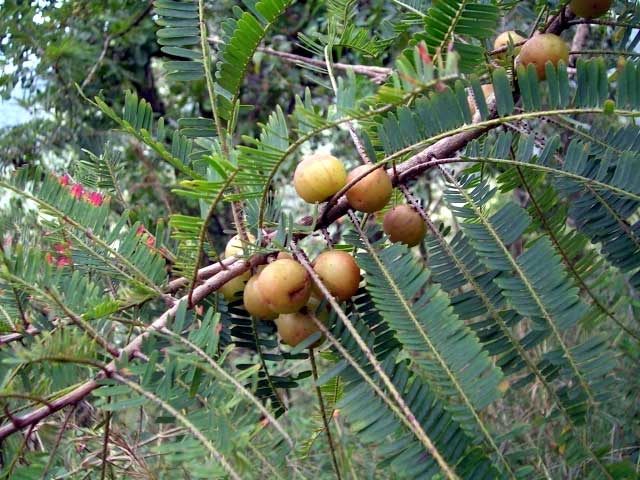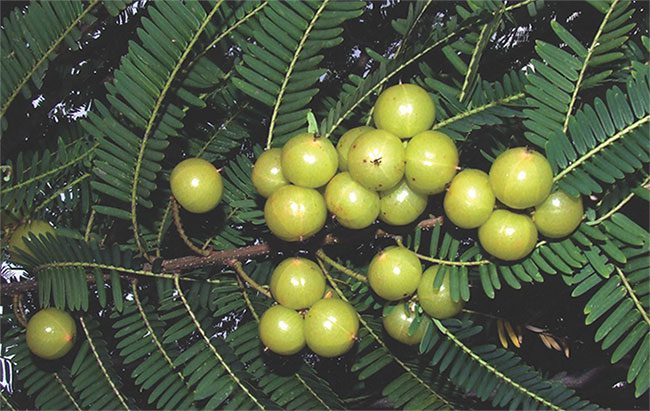The Mắc Kham fruit is in season, a unique fruit from the mountainous regions of Northwest Vietnam, also known as wild tamarind, mountain gooseberry, or emblic fruit. The Mắc Kham fruit is characterized by its sweet and sour flavor, with a slight bitterness that leaves a sweet aftertaste, making it a popular choice among health enthusiasts.
Benefits of Wild Tamarind Fruit
Mắc Kham is scientifically known as Phyllanthus Emblica (or Emblica officinalis), and in English, it is referred to as Amla (or Indian Gooseberry). This edible fruit belongs to the Euphorbiaceae family. The Mắc Kham fruit is round, juicy, contains seeds, is green, and turns slightly yellow when ripe. It has a mildly sour and slightly bitter taste. According to traditional Indian medicine, the entire plant—including the fruit, leaves, and seeds—has medicinal value.
According to Traditional Medicine practitioner Dr. Nguyễn Hữu Trường from Ho Chi Minh City, in Traditional Medicine, Mắc Kham, or wild tamarind, has a cooling property and is used to treat colds, fever, cough, sore throat, and dry mouth. Traditional medicine uses Mắc Kham in various remedies, being recognized more as a medicinal herb than a mere snack. The fruit is also rich in vitamin C. Not only is it a delightful snack, but it also offers surprising benefits for skin beautification and anti-aging.
Rich in vitamin C, Mắc Kham is known for its antioxidant properties. Drinking Mắc Kham juice in the morning can significantly enhance your immune system, combat infections, and improve overall health.
1. Health Benefits of Mắc Kham Fruit
The presence of vitamin C, alkaloids, ellagitannins, gallic acid, emblicanin A and B, flavonoids (especially rutin and quercetin), and many other bioactive molecules contribute to the numerous health benefits of Mắc Kham, making it highly regarded for research on medications with minimal side effects.

Mắc Kham fruit, also known as wild tamarind. (Photo: ST)
Heartburn Relief
According to Healthline, a 4-week study involving 68 people with gastroesophageal reflux disease showed that taking 1,000 mg of Mắc Kham fruit capsules daily significantly reduced the frequency and severity of heartburn and nausea compared to the placebo group.
Anti-Aging Properties
Thanks to its high vitamin C content, Mắc Kham has promising anti-aging benefits. Vitamin C is an antioxidant that may help prevent cellular damage and slow the natural aging process of the body. This includes:
- Skin: Preventing collagen breakdown, which helps the skin maintain elasticity and firmness.
- Hair: Some evidence suggests that Mắc Kham extract may promote hair growth and inhibit an enzyme that causes hair loss.
- Vision: In vitro studies have shown that Mắc Kham extract may help protect against age-related macular degeneration by improving the mitochondrial health of eye cells.
Cancer Prevention
According to Healthline, in vitro and animal studies suggest that extracts from Mắc Kham can help destroy various cancer cells, including breast, cervical, ovarian, and lung cancers.
Additionally, this extract may play a role in preventing cancer effectively due to the high antioxidant properties of phytochemicals such as tannins and flavonoids, along with its vitamin C content.

Mắc Kham fruit can be processed in various ways. (Photo: ST)
However, no human studies have been conducted regarding the anti-cancer effects of Mắc Kham, so cancer patients should adhere to their prescribed treatment plans.
Cardiovascular Health
One of the most common uses of Mắc Kham is to enhance cardiovascular health, which includes:
- Antioxidant effects that help protect the body against oxidative damage related to cardiovascular issues, as shown in some animal studies.
- Endothelial function regulation in type 2 diabetes patients when taking 1,000 mg of Mắc Kham daily, similar to the effects of atorvastatin.
- Anti-inflammatory properties that significantly reduce inflammation, which is believed to be closely related to the development of heart disease.
- Normalizing blood lipids based on observational studies showing significant improvements in blood lipids, including triglycerides, total cholesterol, and bad cholesterol, while increasing good cholesterol.
- Mắc Kham has blood pressure-lowering effects based on mechanisms similar to vasodilators, which help widen blood vessels, thereby improving blood circulation and reducing blood pressure.
- Preventing blood clot formation—a cause of heart attacks and strokes if these clots obstruct the arteries.
However, human studies are still limited, and more research is needed before concluding that Mắc Kham could serve as an effective supplement for cardiovascular health.
Blood Sugar Improvement
Some animal studies have shown that Mắc Kham may help lower fasting and postprandial blood sugar levels. This effect was also noted in a 2011 study published on NCBI involving 32 participants who consumed 1 to 3 grams of Mắc Kham powder for 21 consecutive days.
Liver Protection
According to Healthline, studies on mice indicate that Mắc Kham extract can protect against liver damage caused by high-fat diets or N-nitrosodiethylamine—a liver toxin—due to its anti-inflammatory, antioxidant effects, and the presence of cytochrome P450 2E1 (CYP2E1) inhibitors and membrane-stabilizing properties. However, this effect has not yet been studied in humans.
Immune System Boost
The Mắc Kham fruit is rich in vitamin C, providing 600 – 800% of the daily value (DV) needed, offering several benefits for the immune system such as reducing cellular damage and inflammation, particularly chronic inflammation linked to an increased risk of diseases like type 2 diabetes, heart disease, or autoimmune disorders.
Additionally, vitamin C helps boost the immune system by promoting the proliferation of phagocytes—special immune cells that “devour” harmful invaders in the body.

Mắc Kham fruit is rich in vitamin C. (Photo: ST)
Antibacterial Effects
According to ScienceDirect, both aqueous and organic extracts of Mắc Kham exhibit strong antibacterial activity against bacteria such as Bacillus cereus, Escherichia coli, Pseudomonas aeruginosa, Serratia marcescens, Klebsiella ozaenae, Proteus mirabilis, Salmonella paratyphi A and B, Klebsiella pneumonia, Pasteurella multocida, and Candida albicans.
Fever Reduction and Pain Relief
The polyphenolic content (carbohydrates, amino acids, alkaloids, and tannins) in Mắc Kham extract significantly reduces pain and fever in mouse trials. This opens up potential benefits for Mắc Kham extract in neurological and post-surgical applications.
Joint Pain Relief
According to Health Shots, Mắc Kham possesses anti-inflammatory properties that help reduce inflammation in the body and alleviate symptoms of chronic diseases. Regular consumption of Mắc Kham can reduce joint pain and swelling.
On cold days like today, this is one of the most effective solutions for joint pain relief.
Hair Growth Improvement
Mắc Kham is known for promoting hair health. Drinking Mắc Kham juice strengthens hair follicles, reduces hair loss, and improves the quality and overall texture of hair.
Eye Health
In addition to vitamin C, Mắc Kham is also an excellent source of vitamin A, which is beneficial for vision. Regular consumption will help keep the eyes healthy and reduce the risk of age-related macular degeneration and cataracts.
2. Potential Risks of Mắc Kham Fruit
Mắc Kham fruit may cause some side effects if not consumed correctly or if supplements are misused.
For example, due to its properties that prevent the formation of blood clots, the Mắc kham fruit can thin the blood and inhibit normal blood clotting. However, if you have bleeding disorders or are taking anticoagulant medications, you should consult your doctor to avoid exacerbating these conditions and harming your body. It is also advised not to consume Mắc kham fruit before surgery due to the high risk of bleeding.
You should also be cautious when consuming Mắc kham fruit if you are taking medication for Type 1 or Type 2 diabetes because of the fruit’s effects on lowering blood sugar levels.
Additionally, due to a lack of evidence regarding safety for pregnant or breastfeeding women or those trying to conceive, it is recommended that individuals in these categories should also avoid eating Mắc kham fruit.


















































